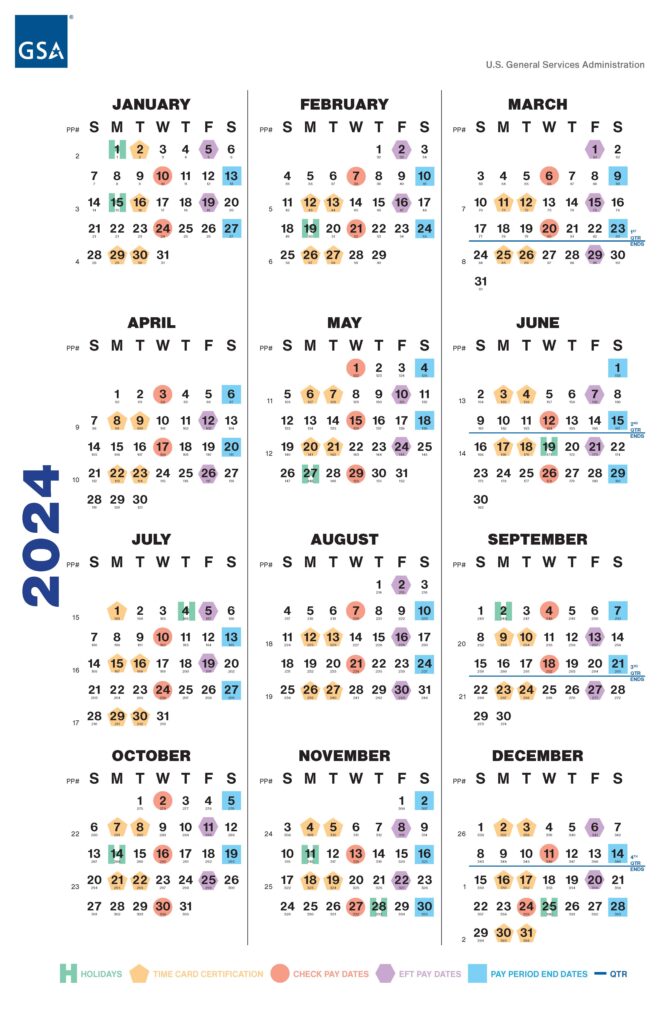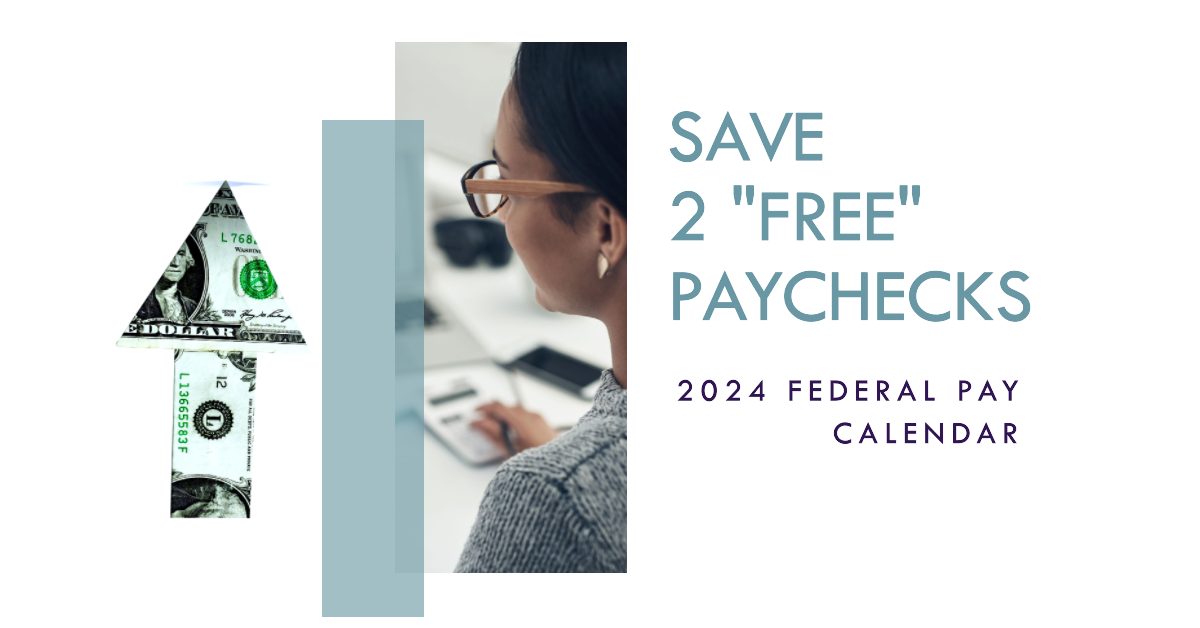2024 Federal Pay Calendar – Save 2 “Free” Paychecks in the New Year!
Are you looking to boost your savings and get on top of your finances in the coming year? Well, we have an exciting opportunity for you! In 2024, you have the chance to save not just one, but two extra paychecks. Yes, you read that right! By understanding the pay periods and using a strategic budgeting hack, you can make the most out of your income and put those extra paychecks to good use. In 2024, the months of March and August are 3 paycheck months.
You can access the official 2024 GSA Payroll Calendar.
26 Paychecks in 2024 – Maximizing Your Paychecks
One of the best ways to maximize your paychecks is by taking advantage of a year with 26 pay periods. This can give you two extra paychecks to work with, allowing you to save more and achieve your financial goals.
How can you save with 26 pay periods?
With 26 pay periods in a year, you can allocate the extra two paychecks towards your savings. Consider setting up an automatic transfer to a high-yield savings account or investment account. This way, you can take advantage of compounding interest and watch your savings grow over time.
Tips for budgeting on a 26-paycheck year
When budgeting for a year with 26 pay periods, it’s essential to plan ahead. Start by dividing your essential expenses, such as mortgage, utilities, and groceries, by 24 pay periods instead of 26. This will ensure that your necessities are covered without feeling the pinch of an extra paycheck.
Next, take the extra paycheck and allocate it towards your financial goals. Whether it’s paying off debt, saving for a down payment on a house, or investing. Having a plan will allow you to make the most of this additional income without ever missing it.
Using the extra paycheck to pay off debt
If you have outstanding debt, like credit card balances or student loans, using the extra two paychecks to make additional payments can help you get ahead. By paying more than the minimum payment, you can reduce the overall interest accrued and pay off your debt faster.
Consider using the debt snowball or avalanche method to prioritize which debts to pay off first. With the extra paycheck, you can make significant progress towards becoming debt-free.
How to plan for 3-paycheck months
In a year with 26 pay periods, you will experience three-paycheck months. These months can provide an excellent opportunity to take care of larger expenses or accelerate your savings goals.
When you receive the third paycheck in a month, evaluate your financial priorities. If you have outstanding bills, consider making larger payments to reduce interest charges. Alternatively, you can put the extra money towards saving for a vacation or investing in your future.
Remember, the key to maximizing three-paycheck months is careful planning and prioritization of your financial goals.
Investing the extra paycheck
If you’re comfortable with your emergency fund and have little to no debt, consider investing the extra two paychecks. You can contribute more to your Thrift Savings Plan (TSP), open an IRA or Roth IRA, save money in a college savings account such as a 529, or place the funds in a taxable investment account.
Investing in stocks, bonds, or mutual funds can help your money grow over time and provide you with additional income in the future. Consult a Certified Financial Planner™ (CFP®) professional before making any investment decisions.
Financial Impact of 26 Pay Periods
How does a 26-paycheck year affect monthly savings?
One of the main advantages of a 26-pay period year is the potential impact it can have on monthly savings. With an additional paycheck, individuals have the opportunity to increase their savings contributions. This can lead to a significant boost in their financial goals, whether it’s saving for a down payment on a house, planning for retirement, or building an emergency fund. By strategically allocating the extra income, individuals can make substantial progress toward their savings targets.
Calculating the additional savings from the extra paycheck
To fully understand the financial benefits of a 26-paycheck year, it’s essential to calculate the additional savings that can be achieved. By determining the amount of the extra paycheck, individuals can evaluate how it can impact their overall savings.
For example, if you earn $125,000/year that would be $4,087 gross per pay period. After taxes, you would net around $2,860. If you were to invest these two extra paychecks each year for 20 years it would have a profound impact on your financial future. At a rate of 6% per year, those two extra paychecks could be $210,000!

Reach Out to Us!
If you have additional federal benefit questions, reach out to our team of Chartered Federal Employee Benefits Consultants (ChFEBC℠), CERTIFIED FINANCIAL PLANNER™ (CFP®), and Accredited Investment Fiduciary (AIF®) professionals. At PlanWell, we focus on retirement planning for federal employees. Learn more about our process designed for the career federal employee.
Preparing for a federal retirement? Check out our scheduled federal retirement workshops. Sign up for our no-cost federal retirement webinars using this link. Make sure to plan ahead and reserve your seat for our FERS webinar, held every three weeks. Interested in having PlanWell host a federal retirement seminar for your agency? Reach out, and we can collaborate with HR to arrange an on-site FERS seminar.
Want to fast-track your federal retirement plan? Skip the FERS webinar and start a one-on-one conversation with a ChFEBC today. You can schedule a one-on-one meeting here.
Q: What is the 2024 Federal Pay Calendar?
A: The 2024 Federal Pay Calendar is a schedule that outlines when federal employees will receive their paychecks in the year 2024.
Q: How often do federal employees get paid?
A: Federal employees are typically paid every two weeks on a biweekly pay schedule.
Q: Why is the biweekly pay schedule used?
A: The biweekly pay schedule is used to ensure that federal employees receive consistent and regular paychecks throughout the year.
Q: How many paychecks do federal employees receive every year?
A: Federal employees receive 26 paychecks per year, as they are paid every two weeks. Sometimes there can be 27 paychecks depending on the year.
Q: Do federal employees get an extra paycheck in certain months?
A: Yes, federal employees may receive an extra paycheck in certain months due to the biweekly pay schedule. This typically occurs twice a year.
Q: Which months do federal employees get an extra paycheck?
A: Federal employees may receive an extra paycheck in the months of March and August, as these months have 3 pay periods instead of the usual 2.
Q: How can federal employees benefit from the extra paychecks?
A: The extra paychecks provide an opportunity for federal employees to save money, pay off debts, or invest in their financial goals.
Q: Will the extra paychecks affect federal employees’ taxes?
A: The extra paychecks may slightly affect federal employees’ taxes. It is recommended to consult with a tax professional for specific guidance.
Q: Can federal employees request to change their pay schedule?
A: The pay schedule for federal employees is determined by the government and cannot be changed on an individual basis.
Q: Is there any interest or APY earned on the extra paychecks?
A: No, the extra paychecks do not earn any additional interest or APY. They are simply an adjustment in the regular pay schedule.
Q: What is the 2024 Federal Pay Calendar?
A: The 2024 Federal Pay Calendar is a schedule that outlines the dates on which federal employees will receive their paychecks in the year 2024.
Q: How can I save 2 “free” paychecks in the new year?
A: You can save 2 “free” paychecks in the new year by making use of the 2024 Federal Pay Calendar. By budgeting and planning your expenses accordingly, you can take advantage of the months when you receive three paychecks instead of the usual two.
Q: What does “paid every” mean?
A: “Paid every” refers to the frequency at which employees receive their pay. In the case of the 2024 Federal Pay Calendar, federal employees are paid every two weeks.
Q: How many paychecks do federal employees usually receive in a year?
A: Federal employees are typically paid bi-weekly except for the months of March and August, which means they receive 26 paychecks in a year.
Q: How many paychecks do federal employees receive in the months with three paychecks?
A: In the months with three paychecks, federal employees receive an additional paycheck, making it a total of three paychecks for that month.
Q: How many months in a year have three paychecks for federal employees?
A: In a year, there are usually two months in which federal employees receive three paychecks instead of the usual two. These months vary from year to year and can be determined using the 2024 Federal Pay Calendar or similar resources.
Q: How can I benefit from receiving three paychecks in a month?
A: Receiving three paychecks in a month allows you to have extra income that you can put towards savings, paying off debts, or investing. It gives you an opportunity to boost your financial goals and take advantage of the additional funds.
Q: Are the extra paychecks a form of overtime?
A: No, the extra paychecks received by federal employees in the months with three paychecks are not overtime pay. They are simply an outcome of the payment schedule and frequency.
Q: Can I set up automatic deposits for the extra paychecks?
A: Yes, you can set up automatic deposits for all your paychecks, including the extra paychecks received in the months with three paychecks. You can do this through your financial institution, such as a bank or credit union. Set up a budget as if you were only to be paid biweekly.
Q: Can I earn interest on the 2 extra paychecks?
A: Yes, you can earn interest on the extra paychecks by depositing them into a savings account or any other type of interest-earning account. This allows you to make your money work for you and potentially grow your savings over time. If you have leftover funds from the two paychecks per month you could also utilize a money market savings account.










